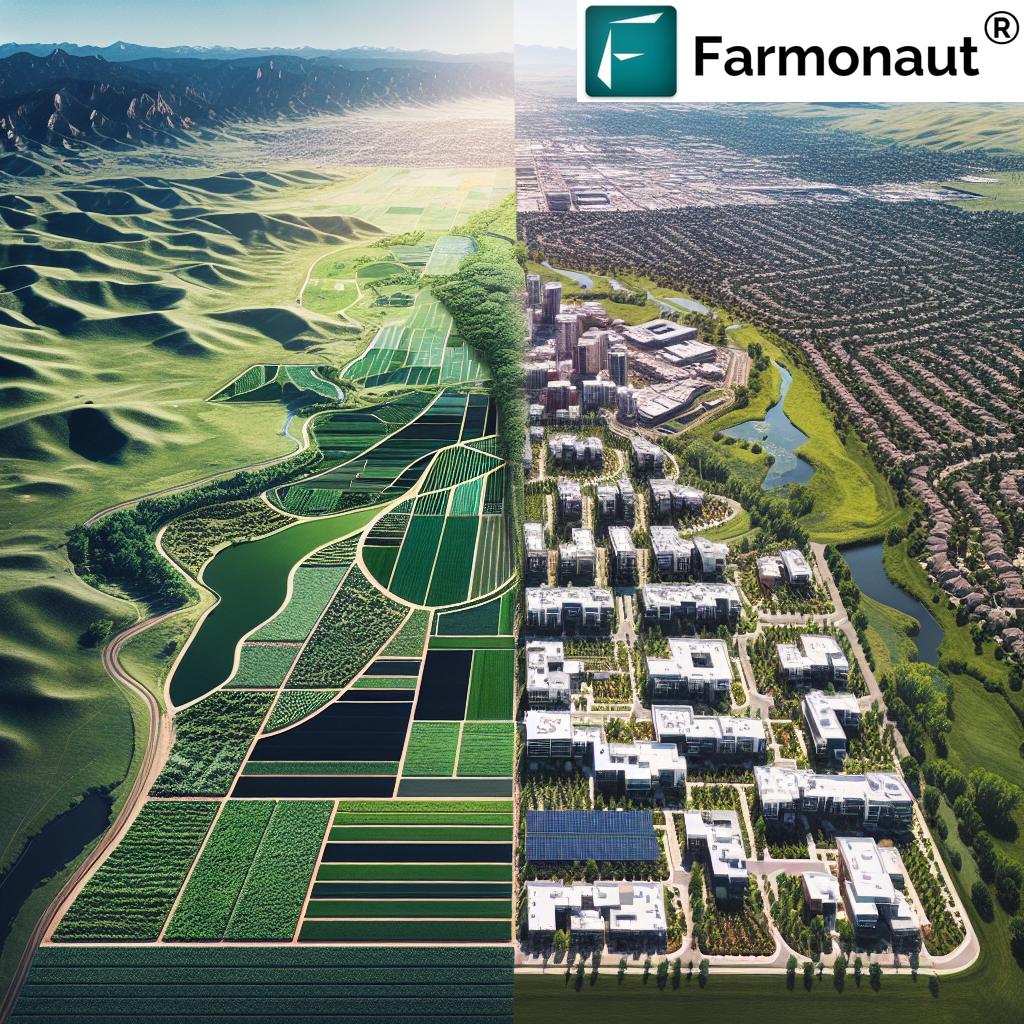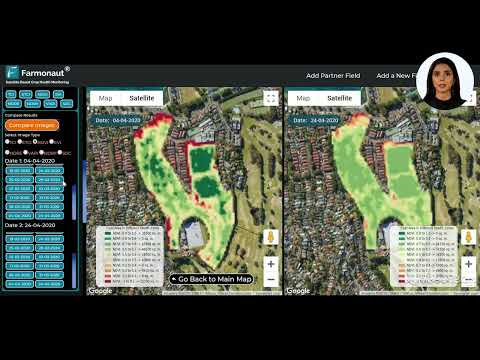Colorado Conservation Battle: How Precision Agriculture Can Preserve Boulder County Farmland
“A 40-acre tract near Longmont, Colorado, is at the center of a legal battle over conservation easement termination.”
In the heart of Boulder County, Colorado, a critical battle is unfolding that could shape the future of farmland preservation and sustainable development in the region. We at Farmonaut, as leaders in precision agriculture technology, recognize the profound implications of this ongoing dispute. The controversy centers around a 40-acre parcel of land near Longmont, where the delicate balance between conservation efforts and community development is being put to the test.
The Core of the Conflict
The conflict arose when Boulder County Commissioners made the decision to conditionally terminate a longstanding conservation easement on the Kanemoto Estates. This move paved the way for Bestall Collaborative Ltd. to seek annexation of the land into Longmont for the ambitious Somerset Village project. The proposed development aims to create a diverse residential community with up to 426 housing units, alongside various communal amenities, all designed with energy efficiency and affordability in mind.
However, this decision has not gone unchallenged. A group of concerned citizens, organized under the banner of Keep Airport Road Environmental and Safe (KARES), has taken legal action to contest the commissioners’ ruling. Their appeal to the Colorado Court of Appeals marks a critical juncture in this ongoing saga, highlighting the complex interplay between conservation, community needs, and governmental decisions that shape the future of Colorado’s landscape.
The Stakes: More Than Just 40 Acres
While the immediate focus is on a relatively small parcel of land, the implications of this case extend far beyond its boundaries. This legal battle could set a precedent for future land-use policies and farmland protection strategies across Colorado and potentially nationwide. At its core, the dispute touches on several critical issues:
- Agricultural Land Preservation: The conservation easement was originally intended to protect scenic and agricultural areas. Its potential termination raises questions about the long-term security of such agreements.
- Sustainable Community Development: The proposed Somerset Village project promises energy-efficient housing and attainable price points, addressing pressing community needs.
- Environmental Conservation: KARES argues that the development could detract from the area’s natural beauty and ecological value.
- Legal Precedent: The outcome of this case could influence how conservation easements are interpreted and enforced in the future.
As we delve deeper into this complex issue, it’s crucial to consider how modern agricultural technologies, such as those offered by Farmonaut, can play a role in balancing these competing interests.
The Role of Precision Agriculture in Land Use Planning
At Farmonaut, we believe that precision agriculture technology has a crucial role to play in addressing the challenges highlighted by the Boulder County case. Our satellite-based farm management solutions offer innovative ways to maximize the productivity and sustainability of agricultural land, potentially reducing the pressure to convert farmland for development.
Here’s how precision agriculture can contribute to preserving farmland while meeting community needs:
- Optimizing Land Use: By providing real-time crop health monitoring and AI-based advisory systems, we enable farmers to make the most of existing agricultural land, potentially reducing the need for expansion.
- Sustainable Resource Management: Our tools help farmers optimize water usage and reduce chemical inputs, making farming more environmentally friendly and economically viable.
- Data-Driven Decision Making: Accurate, up-to-date information on land use and productivity can inform better policy decisions regarding conservation and development.
To explore how Farmonaut’s technology can revolutionize your agricultural practices, visit our web app or download our mobile apps:
The Legal Battle: A Closer Look
The legal challenge mounted by KARES hinges on several key arguments:
- Permanence of Conservation Easements: KARES contends that the very purpose of conservation easements is to provide permanent protection for land, arguing that residents have a reasonable expectation that these protections will endure for generations.
- Compliance with Land-Use Guidelines: The group asserts that by allowing the termination of the Kanemoto Estates Conservation Easement, the county is acting against its own established land-use guidelines.
- Preservation of Agricultural and Environmental Value: KARES believes that the commissioners have overlooked the intrinsic agricultural and environmental value of the land in favor of residential development.
The outcome of this appeal could have far-reaching consequences for how conservation easements are interpreted and enforced across Colorado. It raises important questions about the balance between preserving natural resources and meeting the evolving needs of growing communities.

The Somerset Village Project: A Sustainable Vision?
While the legal battle unfolds, it’s important to consider the merits of the proposed Somerset Village project. The development aims to address several pressing community needs:
- Diverse Housing Options: The plan includes a mix of single-family homes, duplexes, cottages, and townhomes, catering to a range of housing needs.
- Energy Efficiency: All units are designed to be energy-efficient, aligning with goals for sustainable development.
- Affordability: The project promises to offer attainable price points, addressing the growing need for affordable housing in the area.
- Community Amenities: The development includes plans for communal spaces and facilities, potentially enhancing the quality of life for residents.
However, these benefits must be weighed against the potential loss of protected agricultural land and the precedent it might set for future development decisions.
Comparative Analysis: Preservation vs. Development
To better understand the implications of this case, let’s examine a comparative analysis of the potential impacts of preserving the 40-acre tract as agricultural land versus developing it for sustainable housing:
| Factor | Agricultural Preservation | Sustainable Housing Development |
|---|---|---|
| Environmental Impact | Low – Maintains current ecosystem | Medium – Increased human activity, but with green design |
| Economic Benefits | Medium – Continued agricultural production | High – Construction jobs, new residents, increased tax base |
| Community Impact | Low – Preserves rural character | High – Addresses housing needs, new community spaces |
| Long-term Sustainability | High – Protects farmland for future generations | Medium – Depends on implementation of sustainable practices |
| Precision Agriculture Potential | High – Opportunity for advanced farming techniques | Low – Limited to small-scale urban agriculture |
This analysis highlights the complex trade-offs involved in land use decisions. While agricultural preservation maintains environmental integrity and long-term food security, sustainable housing development addresses immediate community needs and potentially stimulates economic growth.
The Broader Context: Rural Development Challenges
“Colorado’s farmland preservation efforts face challenges as court ruling impacts 40 acres of agricultural land near Boulder County.”
The Boulder County case is not occurring in isolation. Across Colorado and many parts of the United States, rural communities are grappling with similar challenges:
- Population Growth: As urban areas expand, there’s increasing pressure to convert agricultural land for residential and commercial use.
- Economic Pressures: Farmers face economic challenges that sometimes make selling land for development an attractive option.
- Climate Change: Changing weather patterns are affecting agricultural productivity, potentially influencing land use decisions.
- Housing Shortages: Many communities are struggling to provide affordable housing options, leading to calls for new developments.
These challenges underscore the need for innovative approaches to land use planning and agricultural management. This is where precision agriculture technology, like that offered by Farmonaut, can play a crucial role.
Farmonaut’s Approach to Sustainable Agriculture
At Farmonaut, we’re committed to making precision agriculture accessible and affordable for farmers worldwide. Our technology can contribute to addressing these challenges in several ways:
- Satellite-Based Crop Health Monitoring: By providing real-time insights into vegetation health, soil moisture levels, and other critical metrics, we help farmers optimize their existing land use.
- AI Advisory System: Our Jeevn AI delivers personalized farm advice, helping farmers make data-driven decisions that improve productivity and sustainability.
- Resource Management: Our tools assist in efficient water usage and optimal fertilizer application, reducing environmental impact and operational costs.
- Carbon Footprinting: We provide real-time data on emissions, enabling agribusinesses to monitor and reduce their environmental impact.
To learn more about how our API can integrate these powerful tools into your agricultural operations, visit our API page or consult our API Developer Docs.

The Way Forward: Balancing Conservation and Development
As we await the outcome of the KARES appeal, it’s clear that finding a balance between conservation and development will require innovative thinking and collaborative efforts. Here are some potential strategies that could help address the challenges highlighted by the Boulder County case:
- Smart Growth Strategies: Implementing urban planning approaches that prioritize infill development and the revitalization of existing urban areas over greenfield development.
- Transfer of Development Rights (TDR) Programs: Establishing programs that allow landowners to sell development rights from areas targeted for preservation to areas where growth is desired.
- Agrihood Developments: Exploring mixed-use developments that integrate agriculture into residential communities, preserving some agricultural use while meeting housing needs.
- Precision Agriculture Incentives: Creating policies that encourage the adoption of precision agriculture technologies to increase the productivity and sustainability of existing farmland.
- Conservation Easement Reform: Reviewing and potentially updating conservation easement laws to provide clearer guidance on when and how these agreements can be modified or terminated.
The Role of Technology in Sustainable Land Use
As we navigate these complex land use challenges, technology will play an increasingly important role. Farmonaut’s precision agriculture solutions offer a glimpse into how advanced technologies can contribute to more sustainable and efficient land use:
- Improved Yield on Existing Farmland: By optimizing crop management practices, we can help farmers produce more food on the same amount of land, potentially reducing the pressure to convert additional land for agriculture.
- Data-Driven Land Use Planning: Our satellite imagery and AI analysis can provide valuable data to inform land use decisions, helping policymakers identify the most suitable areas for conservation and development.
- Sustainable Resource Management: Our tools for efficient water use and targeted fertilizer application can help reduce the environmental impact of farming, making it more compatible with conservation goals.
- Climate-Smart Agriculture: As climate change affects agricultural productivity, our technology can help farmers adapt their practices to changing conditions, potentially preserving the viability of existing farmland.
To explore how Farmonaut’s technology can support your agricultural operations or land use planning efforts, visit our web app.
The Importance of Community Engagement
The Boulder County case underscores the importance of community engagement in land use decisions. As this legal battle unfolds, it’s clear that there are passionate voices on all sides of the issue. Moving forward, it will be crucial to foster open dialogue and seek solutions that address diverse community needs. Some strategies for improving community engagement include:
- Public Forums: Hosting regular public meetings to discuss land use issues and gather community input.
- Collaborative Planning: Involving a wide range of stakeholders, including farmers, developers, environmentalists, and residents, in the planning process.
- Education Initiatives: Providing resources to help community members understand the complexities of land use planning and the potential impacts of different decisions.
- Technology-Enabled Participation: Utilizing digital platforms to facilitate broader participation in planning discussions and decision-making processes.
Looking to the Future
As we await the outcome of the KARES appeal, it’s clear that the Boulder County case will have far-reaching implications for land use planning and conservation efforts in Colorado and beyond. Regardless of the court’s decision, this case has already sparked important conversations about how we balance competing needs for housing, economic development, and environmental preservation.
At Farmonaut, we believe that precision agriculture technology will play a crucial role in addressing these challenges. By enabling more efficient and sustainable farming practices, we can help preserve valuable agricultural land while meeting the needs of growing communities. As we move forward, it will be essential to embrace innovative solutions and collaborative approaches to land use planning.
The Boulder County case serves as a reminder of the complex decisions we face as we strive to build sustainable communities for the future. By leveraging technology, engaging communities, and thinking creatively about land use, we can work towards solutions that honor our agricultural heritage while meeting the evolving needs of our society.
Farmonaut Subscriptions
FAQ Section
Q: What is the core issue in the Boulder County land use dispute?
A: The dispute centers on the conditional termination of a conservation easement on a 40-acre tract near Longmont, Colorado, to allow for a sustainable housing development. This decision is being challenged by a group of concerned citizens who argue for preserving the land for agricultural use.
Q: How could this case impact future land use decisions?
A: The outcome of this case could set a precedent for how conservation easements are interpreted and potentially terminated in the future, influencing land use planning and farmland preservation strategies across Colorado and potentially nationwide.
Q: What role can precision agriculture play in addressing these land use challenges?
A: Precision agriculture technologies, like those offered by Farmonaut, can help optimize existing farmland use, potentially reducing the pressure to convert agricultural land for development. These technologies enable more efficient resource management and sustainable farming practices.
Q: How does the proposed Somerset Village project address community needs?
A: The Somerset Village project aims to provide diverse, energy-efficient housing options at attainable price points, along with community amenities. It’s designed to address housing shortages while incorporating sustainable development practices.
Q: What are some potential strategies for balancing conservation and development?
A: Strategies include implementing smart growth policies, exploring transfer of development rights programs, considering agrihood developments that integrate agriculture into residential communities, and incentivizing the adoption of precision agriculture technologies to increase farmland productivity.
In conclusion, the Boulder County case highlights the complex challenges we face in balancing conservation, development, and community needs. As we move forward, innovative approaches like precision agriculture will play a crucial role in finding sustainable solutions. At Farmonaut, we’re committed to providing the technology and insights needed to support these efforts, helping to create a future where agricultural preservation and community development can coexist harmoniously.





